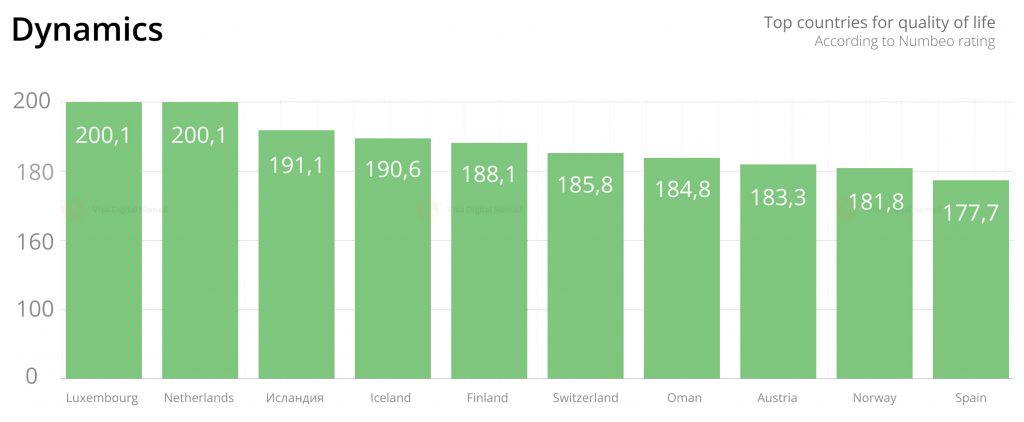«I have never tried so hard or wanted something as much as I want to travel the world and make money.»
Meet Mikhail – an IT specialist with 12 years of experience. He obtained a residence permit in Spain through the “digital nomad visa” program and moved there with his family. In this material, he will share his experience of moving and relocating his family to Spain with a freelancer visa.
Relocating the Family with a Freelancer Visa
Just recently, we discussed the topic “Top 5 Countries Where It’s Easiest to Get a Freelance Visa” in detail on our website. The material sparked considerable interest among visitors, as the opportunity to work remotely abroad is truly enticing. This overview covered countries like Spain, Germany, Croatia, Greece, and France. Each offers freelancers unique conditions and opportunities. If you haven’t seen it yet, we recommend checking it out.
Among the many questions our editorial team receives, one of the most pressing is how to relocate the family after obtaining a freelancer visa. The relocation process is often fraught with challenges for freelancers. The main “pain” point for remote workers is not the process of obtaining their own digital nomad visa but ensuring the legal stay of their family.
Being a digital nomad for me is not just a lifestyle – it’s a story built on years of work, trials, and a love for freedom. After traveling across Russia, I decided to give our family the opportunity to travel the world. Fortunately, my new job’s schedule and income allowed for remote work. Now, we are happier than we were a year ago. The adventures have undoubtedly enriched our lives and brought our family closer together, but let’s start from the beginning.
When choosing among countries with a high standard of living and well-developed infrastructure for freelancers, I settled on Spain. One of the key factors, besides the comfortable climate, was the availability of an accessible freelancer visa, which allowed us to move with minimal discomfort as a family.
Choosing a Region in Spain
As soon as the digital nomad visa for Spain was approved, we had to make an important decision: where in Spain do we want to live? We talked about different cities for a while, but in the end, we chose Alicante… a place none of us had ever visited before.
It was definitely a bit risky (as is moving to another country in general). In the end, there were a few main reasons we felt this city would be perfect for us. Other attractive places included Madrid, Barcelona, Valencia, Seville, Granada. But choosing Alicante, we were not mistaken. Primarily due to the cost of living and housing rental. In Alicante, rent is 49% cheaper, and groceries are 12% cheaper than in Barcelona. Here is a comparison table of rental prices in some cities:
Madrid – in a word, the capital. There is never a shortage of entertainment and delicious food. Filled with lively neighborhoods with lots of entertainment, bars, and restaurants. The transportation system is well-developed and makes it easy to get around the city. For a family, it’s an ideal city with many parks and gardens. We would have loved to live there, but it’s very expensive.
| Type of accommodation | Rental cost |
| Apartment (1 room) | 1500 euros |
| Studio | 990 euros |
| Room | 575 euros |
Barcelona – boasts a large community of immigrants and digital nomads. Therefore, finding like-minded people is not a problem. The transportation is excellent. Traveling between cities is not only safe but also easy. There are plenty of coworking spaces in Barcelona. The city has its own beaches, many opportunities for outdoor sports and walks. But it’s important to understand the living costs.
| Accommodation Type | Rental Cost |
| Apartment (1 room) | 1550 euros |
| Studio | 1000 euros |
| Room | 633 euros |
Valencia – beautiful Mediterranean beaches. A developed real estate market combined with slightly lower rental costs makes Valencia an ideal place to move to (especially when compared to Madrid and Barcelona). A coastal city with a lively atmosphere, hospitable people. Plenty of places for walks and relaxation. Rental housing costs:
| Accommodation Type | Rental Cost |
| Apartment (1 room) | 1400 euros |
| Studio | 836 euros |
| Room | 375 euros |
Alicante – a laid-back lifestyle. An ideal place if you love the atmosphere of a small town but enjoy the fast pace of a metropolis. The city is perfect for freelancers with families. The cost of living is reasonable, and rental prices are adequate. There are plenty of schools and 2 universities. The developed transport infrastructure allows easy travel throughout the country.
| Accommodation Type | Rental Cost |
| Apartment (1 room) | 797 euros |
| Studio | from 400 euros |
| Room | from 300 euros |
Valencia leads the rankings of the safest places to live in Spain with a safety index of 74.52. Overall, all Spanish cities are quite safe to live in, with low levels of violent crime. Barcelona is considered the 11th safest city in the world but attracts many pickpockets and scammers due to its popularity among tourists. Madrid, with a safety index of 70.34, stands out as one of the safest capitals in Europe, but like any major city, it has areas that require special caution. Alicante boasts a promising safety index of 72.60, which is almost comparable to Malaga’s safety index. Malaga itself demonstrates a safety index of 72.72, surpassing Madrid and Barcelona.
Visa and Legal Aspects of Relocation
Future digital nomads of Spain: I want to warn you that becoming a digital nomad in Spain is not for the faint-hearted. To ensure a smooth move to Spain, use this checklist.
- Learn the basics of Spanish culture and traditions. Be prepared for cultural shocks. Understand that the level of English proficiency is low. 99% of the population speaks Spanish.
- Decide where you want to live.
- Prepare a budget corresponding to the cost of living. Create a realistic budget. Financial stability is an important requirement for a successful visa application. Families with children should have a budget ranging from 2200 to 2881 euros per month on average. This includes expenses for groceries, rent and utilities, public transportation, shopping, education/preschool education, and insurance.
- Search for housing. While waiting for your visa approval, it’s time to start looking for accommodation. Start your search 3–4 months in advance, as the influx of foreigners has led to high demand for housing. When renting accommodation, make sure to check if utilities are included in the monthly rent. If not, you will have to organize and pay the bills yourself. And that’s quite a task for a foreigner.
- Translate and legalize documents before arriving in Spain. Before heading to Spain, translate your (and your children’s) birth certificate and marriage certificate into Spanish and apostille it, as they will be needed for all paperwork in Spain. Doing this on-site can be problematic.
- Apply for a residence permit. Upon arrival in Spain, you will need to apply for a residence permit within 30 days to legally reside in the country.
- Register at the town hall (city hall). Anyone who has been living in Spain for more than 6 months must register their address at the city hall. After registration, you will receive an empadronamiento certificate, allowing you to apply for a tax number, obtain medical insurance, purchase real estate.
- Obtain your NIE number. An important document for organizing your life in Spain, and it’s required for anyone living here for more than 3 months.
- Apply for health insurance. In Spain, having valid health insurance is a legal requirement.
- Open a bank account in a Spanish bank. Opening a bank account in Spain will be very useful, as you will easily be able to pay rent, withdraw money, make purchases in stores and restaurants, as well as transfer money to friends in Spain or within the EU with minimal commissions.
- Get a local SIM card. Purchasing a Spanish SIM card will save you a lot of money on local calls and using mobile internet.
- Register for tax payments in Spain. Tax legislation in Spain is complex. Therefore, it is better to know in advance how to register with a tax agency and reduce your taxes.
- Exchange your driver’s license if you plan to drive a car. Spain has agreements with several non-European countries that allow the exchange of foreign driver’s licenses within 6 months. You just need to register with the Spanish Directorate General of Traffic (DGT). If you miss this window, you’ll have to take a theory and practical driving exam in Spanish.
House Hunting
Before traveling to Spain, my number one concern was finding accommodation. Finding a decent apartment in a good location was crucial for me because I knew it could completely change our impression of the trip.
When it comes to choosing accommodation in Spain, you have plenty of options. Here, you’ll find shared apartments, dormitories, studios, apartments, and coliving spaces. The choice and search are a whole adventure.
After compiling a list of popular and reliable websites where you can check landlords’ reputations and tenants’ reviews, I started searching. Here are several authoritative websites to start your search:
There are other websites, such as spotahome.com or pisocompartido.com, where you can rent rooms in shared apartments. This option has become increasingly popular lately. Pay attention to them too.
Financial Matters
Proper management of your budget is the key to a comfortable move and living in Spain, whether you settle in bustling Madrid or sunny Alicante.
Price realities and the cost of living can vary greatly depending on the region. I recommend setting realistic expectations right away. Here’s an example of expenses.
Estimated Expenses
I’m providing an example calculation for a family of three with rare dining out and infrequent entertainment such as movies and amusement parks. Amounts in euros per month, rounded up.
- Restaurants, fast food – 600 euros.
- Going out/cinema – 40 euros.
- Home food – 850 euros.
- Public transportation – 160 euros.
- Utility bills, internet – 200 euros.
- Clothing/shoes – 100 euros.
- Household goods – 180 euros.
On average, with moderate consumption, monthly expenses amount to around 2100 euros. This calculation does not include medical services, gym memberships, travel within the country, etc.
Adapting to a New Life
Once we sorted out bureaucratic, domestic, and financial matters, it was time to finally relax and enjoy the culture of the new country. Adapting to life in Spain primarily involves understanding and embracing its unique customs and traditions. There are several key aspects to learn and remember, but I’m sure you’ll encounter many more that will surprise you.
- Learning Spanish. The task goes beyond simple communication. Communicating with locals in their native language opens doors to many opportunities that will simply be unavailable to those who do not speak Spanish. Learn at least the basic phrases.
- Dress Code. Spaniards usually dress modestly and value style. Don’t wear beachwear and don’t go barefoot in public places. Respect local customs and traditions.
- Cafes. The cafe culture is strong in Spain. Local residents often spend a significant part of the day with a cup of coffee outdoors.
- Siestas. Be prepared for different schedules of institutions and establishments. Many close in the second half of the day or at noon and reopen later in the evening.
- Social Customs. Spaniards have a more tactile culture with their own greeting and gesture system. Remember them, but respect personal space.
- Food. Be prepared for locals to have dinner later. You’ll likely have to adapt to smaller portions and longer lunch times.
Conclusion
Spain is a great place for traveling and relocating as a digital nomad, even with a family. Of course, the choice of the country depends on personal preferences, but the priorities of my lifestyle made it the best choice.
The main advice I want to share with future digital nomads in Spain is not to ignore thorough preparation for the move. Look at safety ratings, standards of living, and the cost of living in individual regions and cities, familiarize yourself with local traditions. And, of course, don’t forget about scammers. Take care of yourself. I’m sure you’ll succeed. Good luck in your new endeavor.













